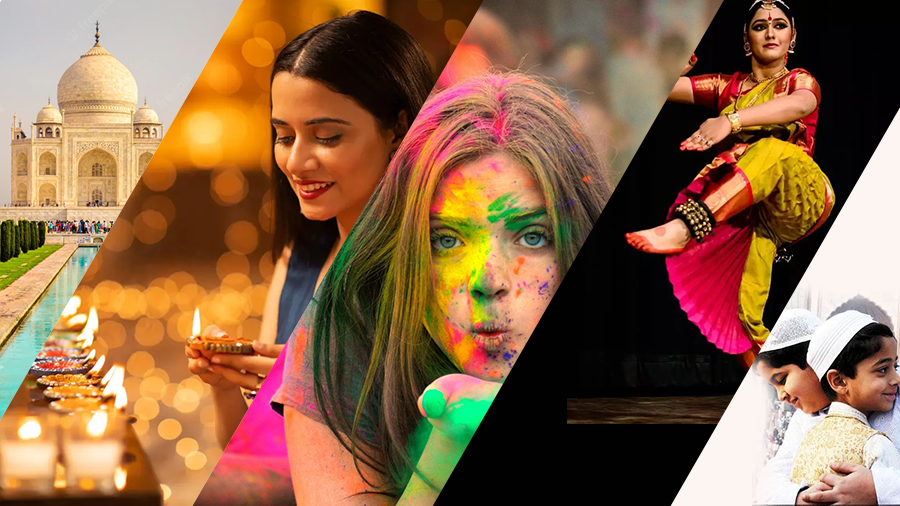
India’s Cultural Richness: How It Strengthens Democratic Ideals
New Delhi, India, 2025 — With over 1.4 billion people, India stands as a testament to the harmonious coexistence of diverse cultures, languages, and traditions. This cultural richness not only defines India’s identity but also underpins its democratic framework. By celebrating diversity, fostering inclusivity, and promoting dialogue, India’s cultural ethos reinforces the very principles of democracy.
This article explores how India’s cultural vibrancy contributes to the strength of its democratic ideals.
Cultural Diversity as the Foundation of Democracy
1. A Pluralistic Society
India’s democracy is built on the coexistence of multiple religions, languages, and traditions.
- Fact: The Census of India (2011) records over 2,000 ethnic groups and 22 official languages, with thousands of dialects spoken across the country.
- Example: Articles 25 to 30 of the Constitution protect religious and cultural freedoms, ensuring that minority groups can preserve their heritage.
- Impact: This inclusivity fosters a sense of belonging and equal participation in the democratic process.
2. Celebrating Festivals Across Faiths
India’s cultural richness is exemplified by the nationwide celebration of diverse festivals.
- Example: Diwali, Eid, Christmas, Gurpurab, and Buddha Purnima are celebrated across states, irrespective of regional or religious affiliations.
- Impact: These shared celebrations promote unity and strengthen the bonds among communities, reinforcing democratic principles of equality and mutual respect.
3. Federal Structure and Regional Identity
India’s federal governance accommodates its cultural diversity, allowing regional identities to thrive within a national framework.
- Example: States like Tamil Nadu and West Bengal maintain distinct linguistic and cultural identities while contributing to national policies.
- Fact: The Eighth Schedule of the Constitution recognizes 22 languages, enabling their use in education, administration, and judiciary.
Cultural Contributions to Democratic Practices
1. Promoting Dialogue and Debate
India’s democratic culture has roots in its philosophical traditions, which value dialogue and dissent.
- Example: Ancient texts like the Upanishads and Buddhist teachings emphasize open discussions, a practice mirrored in modern democratic deliberations.
- Impact: This tradition enables India’s Parliament and civil society to embrace diverse perspectives and seek consensus.
2. Gender Inclusivity in Governance
Cultural values emphasizing respect for women have influenced democratic policies promoting gender equality.
- Fact: The 2024 General Elections saw a record participation of women voters, and 33% of Panchayati Raj seats are reserved for women (Ministry of Women and Child Development).
3. Grassroots Representation
Cultural diversity is reflected in local governance structures like the Panchayati Raj system.
- Example: With over 250,000 gram panchayats, India ensures that even the most remote communities have a voice in decision-making.
Challenges to Cultural Inclusivity in Democracy
1. Communal Tensions
Instances of communal violence threaten the harmony essential for a pluralistic democracy.
- Fact: The Election Commission of India (2024) reported a 15% increase in communal incidents during election campaigns.
2. Linguistic Divides
Efforts to impose a single language occasionally lead to resistance from non-Hindi-speaking states.
- Example: Protests against the Three-Language Formula in Tamil Nadu highlight the need for linguistic sensitivity in policymaking.
3. Regional Disparities
Economic and social inequalities between states can create divisions, undermining the sense of unity.
- Fact: States like Bihar and Uttar Pradesh lag behind Maharashtra and Karnataka in per capita income (NITI Aayog, 2024).
Strengthening Democratic Ideals Through Culture
1. Encouraging Interfaith and Intercultural Dialogue
- Foster platforms for dialogue to promote mutual understanding.
- Example: Initiatives like the National Integration Council address communal issues and promote harmony.
2. Protecting Regional and Tribal Cultures
- Ensure the preservation of cultural identities through education and infrastructure.
- Example: Schemes like EK Bharat Shreshtha Bharat encourage cultural exchange between states.
3. Addressing Economic Inequalities
- Focus on equitable development to reduce regional disparities and strengthen unity.
- Example: Expanding the Aspirational Districts Programme to ensure balanced progress in underserved areas.
Global Relevance of India’s Cultural Democracy
India’s approach to integrating cultural diversity into its democracy offers lessons for the world:
- United States: While celebrating multiculturalism, struggles with racial and ethnic tensions highlight the need for inclusive policies like those in India.
- France: India’s flexibility in accommodating religious symbols contrasts with France’s strict secularism, showcasing a model of cultural pluralism.
Conclusion: A Democracy Rooted in Culture
India’s cultural richness is not just a hallmark of its identity but a pillar of its democracy. By embracing diversity, promoting inclusivity, and fostering dialogue, India strengthens the democratic principles of equality and justice.
As the nation continues to evolve, preserving and celebrating its cultural heritage will be key to sustaining its democratic success, serving as an example of unity in diversity for the global community.




